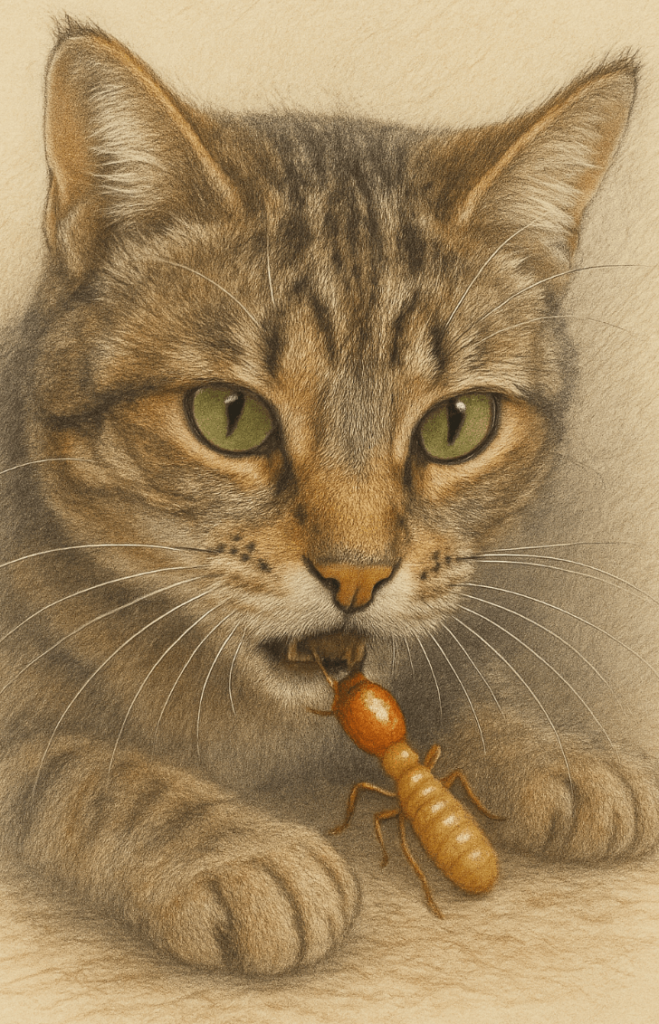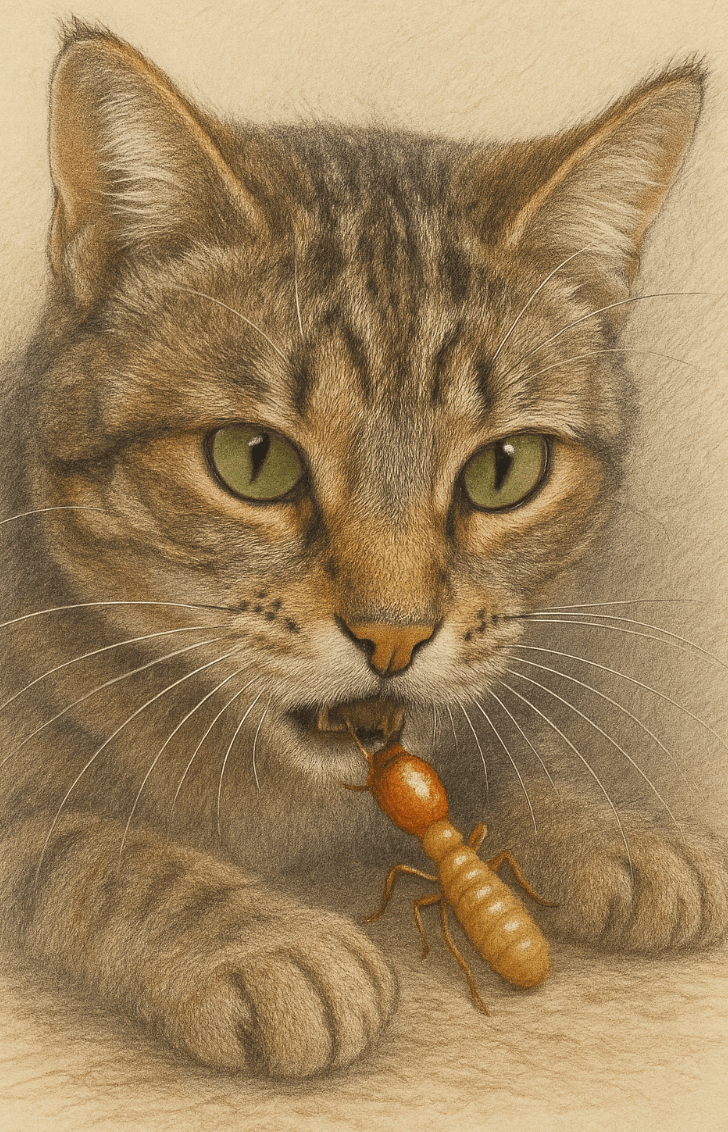Can Cats Eat Termites?
Cats are natural hunters, and their curiosity often leads them to investigate small creatures like insects. One common question that arises is whether cats can safely eat termites. While termites might seem like an unusual snack, they are a source of protein and nutrients in some cultures and ecosystems. But is it safe for your feline friend to munch on these tiny insects? In this blog post, we’ll explore the potential benefits and risks of cats eating termites, what to watch out for, and how to ensure your cat’s dietary choices remain healthy and safe.
Are Termites Safe for Cats to Eat?
In general, termites are not toxic to cats and can be consumed in small quantities without immediate harm. However, there are important considerations to keep in mind before letting your cat indulge in this unusual treat.
Natural Protein Source:
Termites are high in protein, which is an essential nutrient for cats. In the wild, cats may instinctively hunt insects as part of their diet.Potential Allergens:
Some cats may have allergic reactions to insects, including termites. Watch for signs like itching, swelling, or digestive upset after consumption.Chemical Exposure Risk:
Termites found in homes or treated areas may have been exposed to pesticides or insecticides, which can be harmful if ingested by your cat.Choking Hazard:
While rare, large termite swarms could pose a choking risk if your cat tries to eat too many at once.Digestive Tolerance:
Most cats can digest termites without issue, but some may experience mild stomach upset due to the unfamiliar food source.
While termites are generally safe, it’s crucial to monitor your cat’s behavior and health after they’ve eaten them to ensure no adverse effects occur.
Benefits of Cats Eating Termites (If Any)
Although termites aren’t a staple food for domestic cats, they do offer some minor nutritional benefits when consumed occasionally. Here’s a closer look at the potential advantages.
High-Quality Protein:
Termites contain lean protein, which supports muscle development and overall health in cats.Low Fat Content:
Unlike some other snacks, termites are low in fat, making them a lighter option for your cat’s diet.Natural Foraging Behavior:
Hunting and eating insects like termites can satisfy your cat’s instinctual need to stalk and capture prey.Environmental Enrichment:
Engaging with insects provides mental stimulation and physical activity, keeping your cat entertained.Minimal Caloric Impact:
Termites are low in calories, reducing the risk of weight gain if consumed in moderation.
While these benefits exist, they should be weighed against the potential risks and the availability of safer, nutritionally balanced alternatives.
Check this guide 👉Can Cats Eat Geckos? Best 7 Expert Tips!
Check this guide 👉Can Cats Eat Apple Cider Vinegar? Best 7 Expert Tips!
Check this guide 👉Can Cats Eat Alfalfa Sprouts? Best 7 Expert Tips!

Pros of Cats Eating Termites | Cons of Cats Eating Termites |
|---|---|
High-quality protein source | Risk of pesticide exposure |
Low-fat, low-calorie snack | Potential for allergic reactions |
Encourages natural hunting instincts | Possible digestive upset |
Provides mental enrichment | Choking hazard if eaten in large amounts |
Generally non-toxic | Not nutritionally complete |
How to Safely Monitor Your Cat Around Termites
If your cat shows interest in eating termites, it’s important to supervise and take precautions to ensure their safety. Follow these guidelines to minimize risks.
Check for Pesticides:
Ensure the termites haven’t been exposed to harmful chemicals or insecticides used in pest control treatments.Limit Quantity Consumed:
Allow your cat to eat only a few termites at a time to prevent overconsumption and potential digestive issues.Observe for Reactions:
After ingestion, monitor your cat for symptoms like vomiting, diarrhea, or lethargy, which could indicate a problem.Create a Controlled Environment:
If you want to encourage safe insect-eating, consider introducing farm-raised insects designed for pet consumption.Consult Your Veterinarian:
If you’re unsure about your cat’s tolerance or dietary needs, seek advice from your vet before allowing them to eat termites.
By taking these steps, you can help ensure your cat enjoys this unique snack without compromising their health.
Signs Your Cat May Have Eaten Harmful Termites
If your cat consumes termites exposed to toxins or eats them excessively, they may exhibit signs of illness. Recognizing these symptoms early allows you to act quickly.
Vomiting or Diarrhea:
Gastrointestinal distress is a common sign of toxin ingestion or intolerance to unfamiliar foods.Excessive Drooling:
Drooling could indicate irritation in the mouth or throat caused by chemical residues on the termites.Lethargy or Weakness:
A sudden lack of energy may signal poisoning or another serious issue requiring immediate attention.Difficulty Breathing:
Labored breathing suggests respiratory distress, possibly from inhaling pesticide particles during termite consumption.Loss of Appetite:
Refusal to eat or drink can indicate discomfort or illness stemming from consuming harmful substances.
If you notice any of these signs, contact your veterinarian immediately to address potential complications.
Common Misconceptions About Cats Eating Termites
There are several misconceptions about cats eating termites that can lead to confusion among pet owners. Let’s clear up some of these myths.
All Insects Are Safe for Cats:
While termites are generally harmless, other insects may carry parasites or toxins that could harm your cat.Eating Termites Can Replace Commercial Food:
Termites lack essential nutrients like taurine, which cats need in their diet; they should never replace balanced meals.Cats Will Know What’s Safe to Eat:
Cats rely on instinct but aren’t always aware of dangers like pesticide-treated termites. Supervision is key.Termites Are Just a Nuisance, Not a Snack:
To cats, termites are an opportunity to engage in natural hunting behavior—it’s more than just curiosity.Pesticide-Free Termites Are Always Safe:
Even untreated termites can cause issues if consumed excessively or if your cat has underlying sensitivities.
Understanding these facts helps you better manage your cat’s interactions with termites.
Alternatives to Feeding Termites to Your Cat
If you’re concerned about letting your cat eat termites, there are safer ways to satisfy their hunting instincts and nutritional needs.
Farm-Raised Insects:
Crickets and mealworms sold as pet treats are specifically raised for consumption and free from harmful contaminants.Interactive Toys:
Puzzle feeders and toys that mimic prey movements provide mental stimulation and fulfill hunting desires.High-Quality Treats:
Commercial cat treats made from real meat or fish offer a nutritious alternative to insects.Homemade Prey Simulations:
Create DIY toys using feathers or fabric strips to simulate the thrill of catching live prey.Supervised Outdoor Time:
Allow your cat to explore bug-free environments where they can safely engage with nature.
These alternatives ensure your cat stays entertained and nourished without relying on termites.
Tips for Managing Termite Infestations Around Cats
If you’re dealing with a termite infestation, it’s important to protect your cat while addressing the problem. Here are some practical tips.
Use Pet-Safe Pest Control Products:
Opt for non-toxic solutions like bait stations or eco-friendly sprays that won’t harm your cat.Keep Cats Away During Treatment:
Restrict access to treated areas until all chemicals have dried or dissipated completely.Seal Entry Points:
Prevent termites from entering your home by sealing cracks and gaps in walls, windows, and doors.Monitor Your Cat’s Behavior:
Pay attention to changes in appetite, energy levels, or demeanor that might indicate accidental exposure.Consult Professionals:
Work with pest control experts who specialize in pet-friendly methods to eliminate infestations safely.
Taking these precautions ensures your cat remains safe while you tackle termite problems effectively.
Frequently Asked Questions About Cats and Termites
Is it normal for cats to eat termites?
Yes, it’s natural for cats to hunt and eat small insects like termites as part of their predatory instincts.
Can termites harm my cat?
Termites themselves are not harmful, but those exposed to pesticides or eaten in large quantities can cause issues.
What should I do if my cat eats poisoned termites?
Contact your veterinarian immediately and provide details about the situation for proper guidance.
Are there safer insect options for my cat?
Farm-raised insects like crickets or mealworms, specifically marketed for pets, are safer alternatives.
Should I discourage my cat from eating termites?
It depends on the circumstances. If the termites are safe and consumed in moderation, occasional snacking is fine.
Balancing Curiosity and Safety for Your Cat
Cats’ natural curiosity often leads them to explore and consume things we might not expect, such as termites. While termites are generally safe for cats to eat in small amounts, it’s essential to remain vigilant about potential risks, especially chemical exposure or overconsumption. By understanding their instincts, monitoring their behavior, and consulting your veterinarian when needed, you can strike a balance between allowing your cat to express their natural behaviors and ensuring their well-being. Remember, a happy and healthy cat is one whose adventures are both fun and safe!
Do Cats Have Taste Buds? Best 7 Expert Tips! – Discover how cats experience flavors and why their taste is so unique.
Do Dogs Have Taste Buds? Best 7 Expert Tips! – Discover how dogs experience taste, their preferences, and what it means for their diet and health.
Can Cats Taste Sweet? Best 7 Expert Tips! – Discover why cats can’t taste sweetness, how it affects their diet, and tips to keep them healthy and happy.
Can Dogs Taste Sweet? Best 7 Expert Tips! – Discover how dogs perceive sweetness, which foods are safe, and tips to manage their sweet cravings responsibly.





